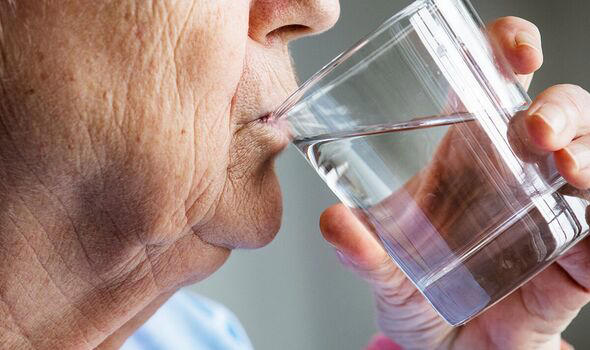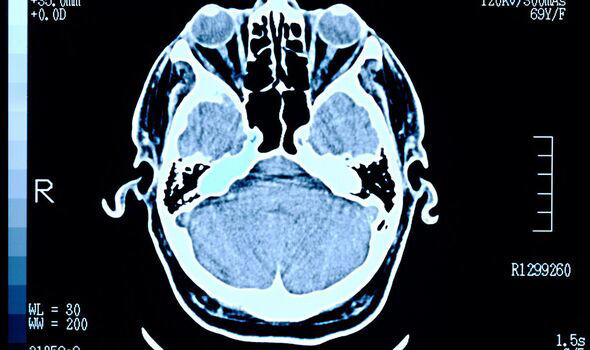Vitamin B12 deficiency symptoms: How to spot the signs in your feet














Vitamin B12 deficiency symptoms: How to spot the signs in your feet
Vitamin B12 is vital to maintain healthy energy levels and is one of the most important vitamins in maintaining the nervous system. Consistently low levels of B12 can cause "damage" to parts of the nervous system, warns the NHS, even leading to irreversible damage.
The nervous system has two main parts: the central nervous system, which is made up of the brain and spinal cord, and the peripheral nervous system, which is made up of nerves that branch off from the spinal cord and extend to all parts of the body.
A B12 deficiency can lead to peripheral neuropathy, which develops when nerves in the body's extremities such as the hands, feet and arms are damaged, reports MyLondon.
According to the NHS, the main symptoms of peripheral neuropathy in your feet include:
- Numbness
- Tingling
- Muscle weakness
"These symptoms are usually constant, but may come and go," explains the health body. It's important to see your GP if you're experiencing any of the above symptoms.
What causes B12 deficiency?
Pernicious anaemia is the most common cause of vitamin B12 deficiency in the UK. Pernicious anaemia is an autoimmune condition whereby your immune system attacks the cells in your stomach that produce the intrinsic factor, which means your body is unable to absorb vitamin B12.
However, some people can develop a vitamin B12 deficiency as a result of not getting enough vitamin B12 from their diet. The richest sources of B12 are animal-based so vegetarians and vegans are at a greater risk of B12 deficiency.
B12 is naturally found in:
- Meat and liver
- Fish
- Clams
- Milk and dairy products
- Eggs.
Plant-based sources of vitamin B12 include yeast extract (such as Marmite) fortified plant milks and fortified breakfast cereals.
How to treat at B12 Deficiency
"If you’re following a plant-based diet, taking a vitamin B12 supplement can help prevent a deficiency," says Holland and Barrett. "Breast-feeding mothers could also consider a supplement, as they need an extra 0.5mcg a day."
As it explains, older people, or those taking medication to reduce production of stomach acid, may need a B12 supplement to boost absorption. Most cases of vitamin B12 and folate deficiency can be easily treated with injections or tablets to replace the missing vitamins, the NHS says.
Vitamin B12 supplements are usually given by injection at first. Then, depending on whether your B12 deficiency is related to your diet, you'll either require B12 tablets between meals or regular injections.
Dehydration may be as bad 'as smoking' for veins - how much water you need to avoid stroke















Dehydration may be as bad 'as smoking' for veins - how much water you need to avoid stroke
Strokes are rarely preceded by obvious warning signs, making the chances of survival relatively slim. Taking precautionary steps against stroke is therefore paramount for preventing complications. Fortunately, researchers have identified several preventable risk factors for the condition. Their findings indicate that a great number of patients show up to the hospital dehydrated.
According to Harvard Health, the warning signs of dehydration include weakness, low blood pressure, dizziness, confusion or urine that's dark in colour.
The minimum amount of water a person needs to avoid these signs is around four to six cups of water each day, according to the health body.
Research conducted by Loma Linda University, however, has previously established that drinking at least five glasses of water is necessary for reducing the risk of stroke by 53 percent.
Not only may this protect against the condition, but it may also improve a person's outcome in the event of a stroke.
In 2015, research on patients admitted to the Comprehensive Stroke Center at Johns Hopkins Hospital provided interesting findings about the cardiovascular risks of dehydration.
The research showed that dehydrated patients were nearly four times more likely to suffer worse outcomes, compared to adequately hydrated patients.
It was noted that "dehydration appears to be common in hospitalised stroke patients and is associated with severe stroke and poor outcomes at hospital discharge".
The report added: "We suggest that focusing on interventions to reduce the frequency and duration of dehydration have the potential to improve patient outcomes after stroke."
In 2016, research by the University of Arkansas made another poignant discovery about the effects of dehydration on cardiovascular health.
The findings suggested that hydration levels - even mild dehydration in healthy, young males - may play a role in a person's cardiovascular risk.
The effects of hydrations levels were most apparent in the endothelial functions of the blood vessels.
Endothelial function describes the dilation and constriction of the endothelium, the inner lining of blood vessels.
"It plays a critical role in cardiovascular health," explains Science Daily.
The result, published in the European Journal of Nutrition established that even mild dehydration could "impair vascular functions nearly as much as smoking a cigarette".
The Michigan Neurology Associated noted that dehydration may also have a thickening effect on the blood, which poses its own set of risks.
Viscous blood causes the body to retain more sodium, which in turn increases blood pressure.
Not only does this present an opportunity for blood clots to form, but blood flow may also slow down.
As a result, blood may back up in blocked or narrowed blood vessels and cause a stroke.
"If you have other heart disease risk factors, such as clogged arteries, dehydration can be especially dangerous," warns the health body.
It should be noted that though adequate hydration is important for vascular health, drinking excessive amounts of water is not recommended either, as this can be especially dangerous for people who had heart and kidney conditions.
Winter Squash: A Superfood Or Not? Nutrition Professionals Weigh In, With Serving Tips And Health Risks















Winter Squash: A Superfood Or Not? Nutrition Professionals Weigh In, With Serving Tips And Health Risks
Perspective from Iyanuoluwa Oyetunji
Master of Science in Medicine, specialization in Human Nutrition · 2 years of experience · South Africa
Possible Side Effects
- Due to the high level of fiber in winter squash, an excessive intake may cause side effects such as flatulence, bloating or diarrhea.
Quantity Recommendation
- Winter squash is a fruit, 2 - 4 servings of fruits are recommended to be taken per day. A cup of winter squash is a serving. It is important to consider underlying health conditions, as well as maintain variety in the diet by including other fruits when eating winter squash.
Perspective from Kiran Dhaliwal
Master's Degree Nutrition and Dietetics · 3 years of experience · Australia
Possible Side Effects
- As it is high in potassium people who are using ACE inhibitors or beta-blockers should eat these foods in moderation.
- Individuals with kidney issues should also be careful when consuming winter squash as it is high in potassium. If kidneys fail to remove excess potassium from the blood it can be dangerous.
Quantity Recommendation
- A varied intake of nutrient-rich foods such as fruit and vegetables is the key to great health. It is more vital to be paying attention to a variety of foods than individuals foods. It is suggested to eat 5 servings of vegetables per day, and a serving of squash is 1 cup. Winter squash is one of the least allergenic foods as it does not contain high levels of oxalates and purines. Hence, if you have any reaction to these foods do not consume and do an allergy test.
This is for information purpose only, and should not be considered as a substitute for medical expertise. These are opinions from an external panel of individual doctors, and not to be considered as opinion of Microsoft. Please seek professional help regarding any health conditions or concerns.
Story by Iyanuoluwa Oyetunji and Kiran Dhaliwal
Why The Nutrition Professionals Love Winter Melon, Nutritional Benefits And Serving Size Guidelines












Why The Nutrition Professionals Love Winter Melon, Nutritional Benefits And Serving Size Guidelines
Benefits by Iyanuoluwa Oyetunji
Master of Science in Medicine, specialization in Human Nutrition · 2 years of experience · South Africa
- Winter melon keeps the body hydrated and aid digestion, as it is about 96% water and rich in fiber.
- Winter melon is rich in potassium which is a vasodilator, and vitamin C which is a powerful antioxidants. The fruit can therefore maintain cardiovascular health and boost immunity.
This is for information purpose only, and should not be considered as a substitute for medical expertise. These are opinions from an external panel of individual doctors, and not to be considered as opinion of Microsoft. Please seek professional help regarding any health conditions or concerns.
Story by Iyanuoluwa Oyetunji, Caroline Luiza C. Castro, Christos Sittas: Microsoft Health
Articles - Most Read
- Home
- LIVER DIS-EASE AND GALL BLADDER DIS-EASE
- Contacts
- African Wholistics - Medicines, Machines and Ignorance
- African Holistics - Seduced by Ignorance and Research
- African Wholistics -The Overlooked Revolution
- The Children of the Sun-3
- Kidney Stones-African Holistic Health
- PART ONE: DIS-EASE TREATMENT AND HEALTH-3
- 'Tortured' and shackled pupils freed from Nigerian Islamic school
- The Serpent and the RainBow-The Jaguar - 2
- PART ONE: DIS-EASE TREATMENT AND HEALTH-2
- PART ONE: DIS-EASE TREATMENT AND HEALTH-4
- PART ONE: DIS-EASE TREATMENT AND HEALTH-5
- King Leopold's Ghost - Introduction
- African Wholistics - Medicine
- Menopause
- PART ONE: DIS-EASE TREATMENT AND HEALTH-6
- The Mystery System
- The Black Pharaohs Nubian Pharaohs of Ancient Egypt
Who's On Line?
We have 61 guests and no members online
Ad Agency Remote
Articles - Latest
- Burdock – 7 Amazing Benefits & Nutrition Facts
- Ask A Nutrition Professional: Can Eating Raw Zucchini Cause Pain?
- Five things I wish I knew before starting hormones as a trans person
- ‘Hidden’ bacteria could explain chronic urinary tract infections
- Chinese scientists create mutant Ebola virus in lab
- ‘Magic mushrooms’ could be effective antidepressant after one dose, study suggests
- Does Valerian Root Cause Weight Gain? A Review By Nutrition Professionals
- No Salt Alternatives
- The world’s deadliest infectious disease is on the rise in the UK
- The Best Substitutes for Allspice
- What is gender dysphoria and how can you support your trans friends?
- Pioneering cooling boots and mittens to help stop chemo side-effect
- Ask A Nutrition Professional: How Do I Prepare Yellow Squash?
- The anti-ageing benefits of eating protein
- New analysis of cancer cells identifies 370 targets for smarter, personalized treatments
- Pattypan Squash: Nutrition Professionals Weigh In on the Right Amount.
- Ways to manage chronic pain
- The more fertile you are, the sooner you may die — study Story by Fred Schwaller
- You stand like an overcooked prawn!’ Why bad posture is the key to back pain – and 10 ways to improve yours





